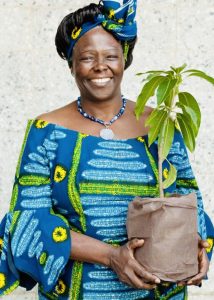Written by: Admin_SheEvo
This is the story of the African woman who made me love the environment. Her story inspired me to pursue a career in environmental and climate justice, and it also inspired me to pursue my dreams, irrespective of the societal limitations placed on my skin colour and gender.
Wangari was born in Kenya on April 1st, 1940, during British colonial rule. Her family was of Kikuyu origin, and her father was polygamous. As a child, Wangari, was given a small plot of land to grow her own food and to learn how to cultivate the land. She completed her primary and secondary education in Kenya. In 1960, she received a scholarship to commence her university studies in the United States of America, where she received a Bachelor’s and a Master’s degree in Biological Sciences. In April 1966, after returning to Kenya, Wangari met her future husband, Mwangi Mathai, a politician. The two got married in May 1969.
From 1966 to 1982, Wangari Maathai was a lecturer at the University of Nairobi, and in 1971, Wangari received her Doctorate in Veterinary Anatomy from the University of Nairobi, becoming the first woman in eastern Africa to receive a PhD.


Wangari was imprisoned several times in the 1980s for criticizing Kenyan President Daniel Arap Moi and for demanding multi-party elections in Kenya. She stood for environmental justice due to new construction developments that endangered the environment and indigenous peoples’ rights. Furthermore, in 1992, Maathai ran for president on a platform urging environmental protections. And at that time, she was the first African politician to embrace that cause publicly. She withdrew from the elections but ran again in 1997. In 2003, she founded the Mazingira Green Party of Kenya and later that year, she was appointed Assistant Minister for Environmental and Natural Resources by Kenyan President Mwai Kibaki. 

In 2004, Maathai won the Nobel Prize for her work in protecting the environment through political lobbying and reforestation initiatives. These initiatives were aimed at empowering rural women in Kenya. This was an outstanding award as it’s prestige helped put environmental rights on the map.
In 2006, she was one of the founders of the Nobel Women’s Initiative, an organization of six women recipients of the Nobel Prize, representing North and South America, Europe, the Middle East, and Africa, who united in their efforts to work for peace, justice, and equality throughout the world. In January 2007, Maathai hosted the Global Young Greens conference in Nairobi, which some have described as a meeting of the next wave of the leadership of the world environmental movement. In addition, Maathai wrote four books, including “The Greenbelt Movement: Sharing the Approach and the Experience”.
At 71, Wangari Maathai died from complications from ovarian cancer treatment at a Nairobi hospital.
But her legacy lives on!
Today millions of women like myself have gained inspiration from her story and aim to share this story with many people. Her passion, resilience and approach to environmental rights and gender equality contributed significantly to my career path. I am forever grateful!
Source for reference:
The founder of the Green Belt Movement and the 2004 Nobel Peace Prize Laureate
Photo 1 and photo 2 credit: Pinterest




